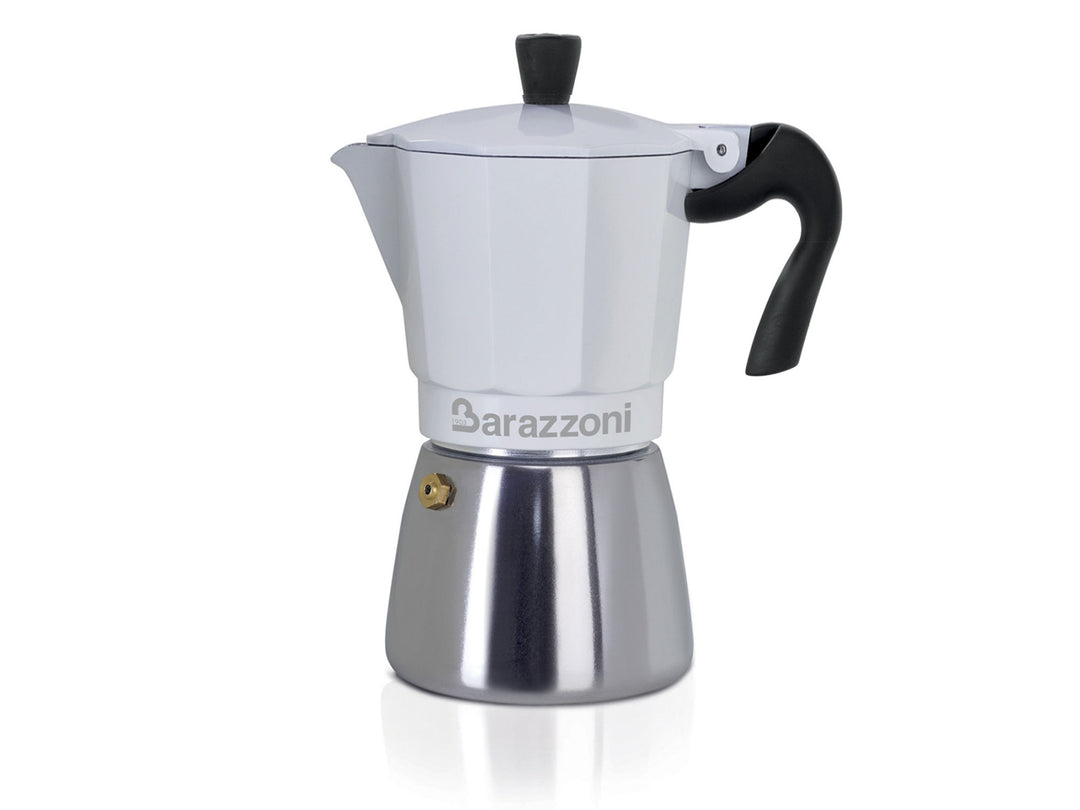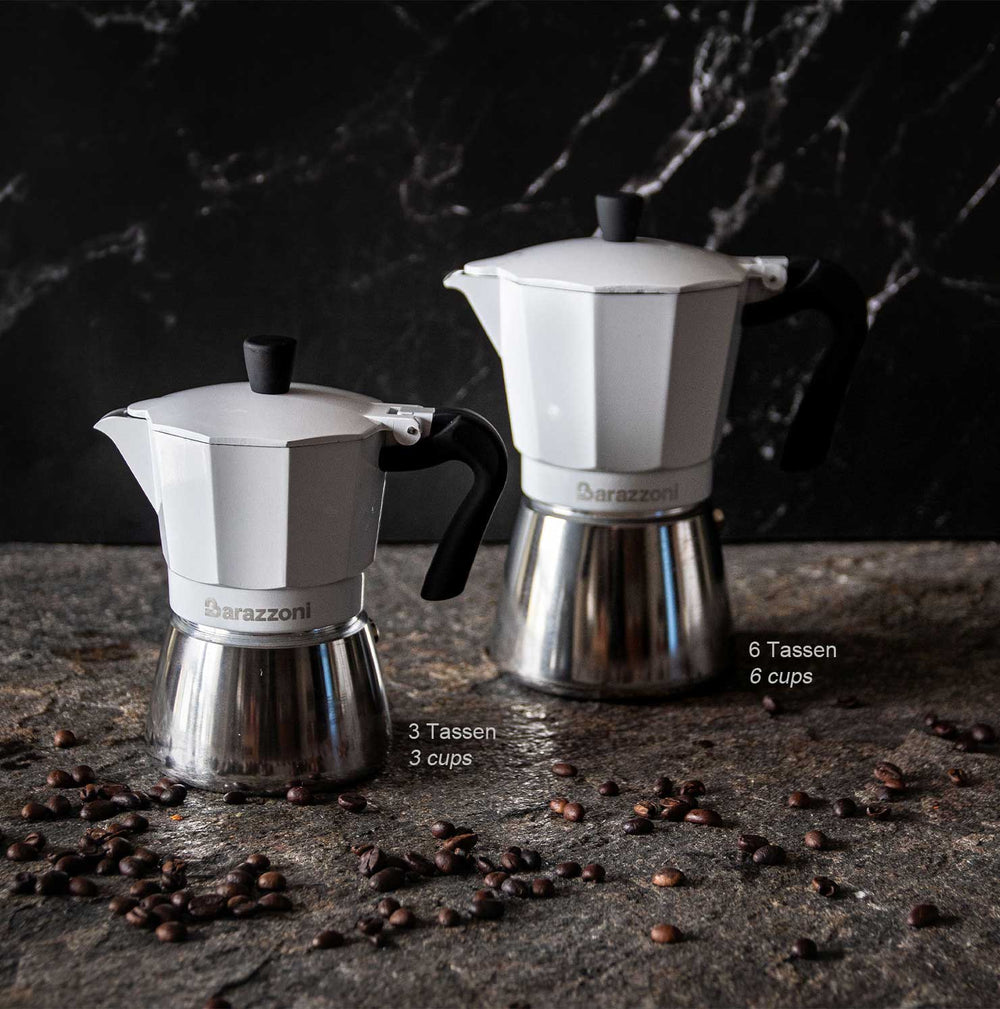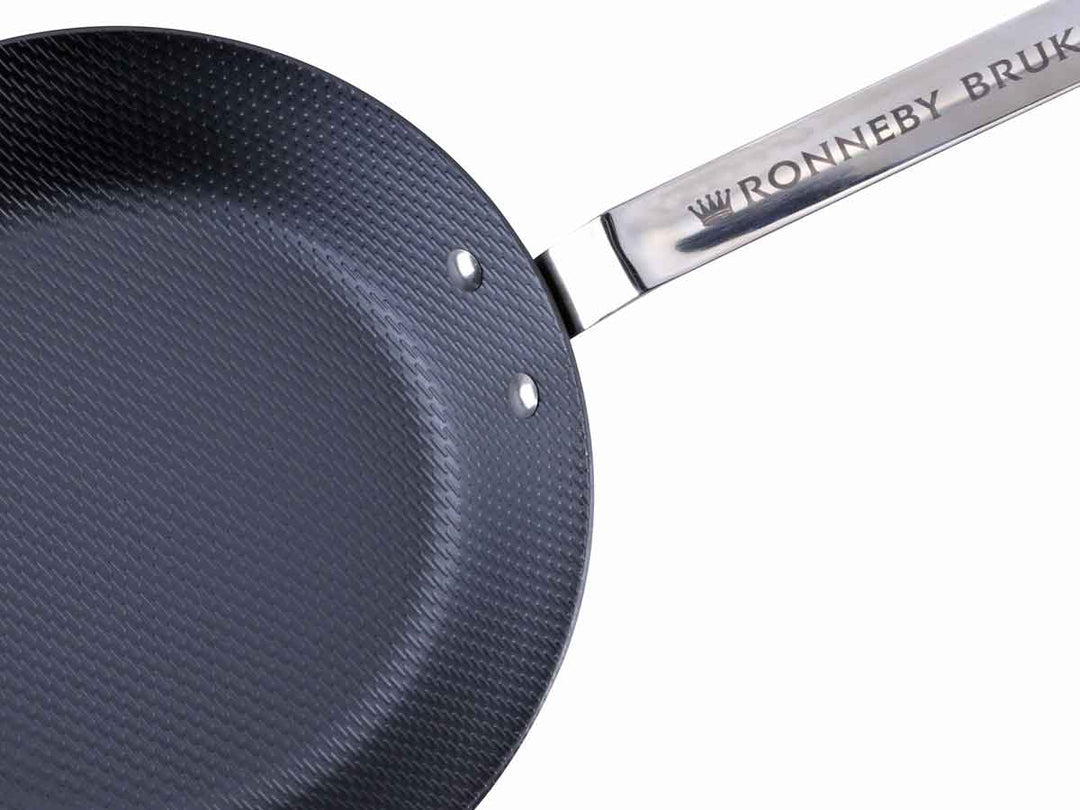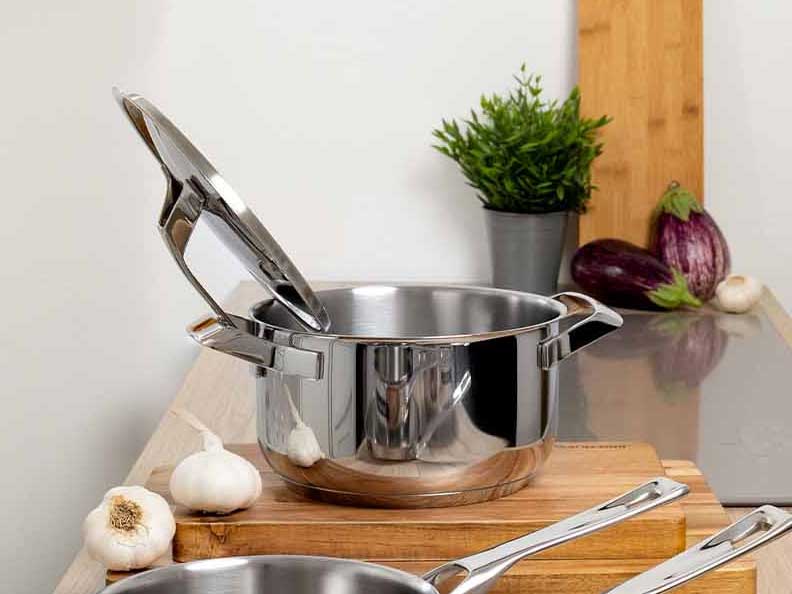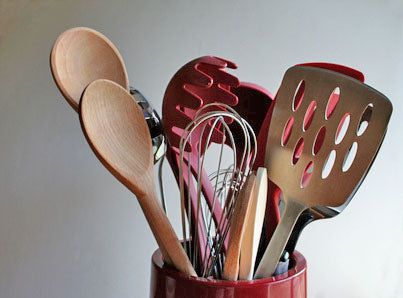Induction-suitable coffee maker for up to 6 cups of real Italian coffee.
This coffee maker skillfully combines tradition and modernity and is thus basically typical for the Italian manufacturer Barazzoni. For the tradition stands the angular aluminum coffee container, which is here in an elegant white. And for modernity stands the water container made of stainless steel, which allows the Moka pot to be used even on an induction hob.
- A quality product from Barazzoni.
- Coffee maker for up to 6 small cups of about 50-60 ml each.
- Tested and approved by the Italian Academy of Coffee Masters, AICAF.
- Hybrid construction: Upper part made of aluminum (food safe according to EN601 standard), painted white on the outside, lower part made of stainless steel suitable for induction, polished.
- High quality silicone gasket for optimal sealing and long life.
- Water tank with safety pressure relief valve.
- Pot handle and lid knob made of heat-insulating plastic.
- Weight approx. 0.7 kg.
- Height with lid approx. 20.3 cm.
- Diameter of the contact surface approx. 9.5 cm.*
- Suitable for all types of stoves, including induction.
INFO: Espresso, moka, mocha, coffee? Which one is it?
Such coffee makers are often called espresso pot in Germany, although they are not made / suitable for the preparation of espresso, as known from an espresso machine. However, since in Italy a normal coffee is usually understood to be a small and quite strong coffee, which according to German understanding is more similar to an espresso, the term espresso pot has become common in Germany for this type of coffee maker.
The term Caffettiera is also commonly used in Italy for such a coffee maker.
If you don't like coffee so strong but want to make it this way, you can also dilute the finished coffee well with hot water for a kind of Caffè Americano, or take the strong coffee as a base and add milk or milk foam for a delicious mixed coffee drink.
How does a coffee maker like this work?
- Fill water into the water container, no more than just below the safety relief valve, never above.
- Insert the funnel insert and fill it with ground coffee.
- Screw the coffee container together with the seal onto the water container.
- The coffee maker is then placed on the stove and heated at low heat (!).
The pressure of the boiling water forces it through a riser tube into the funnel insert in the center of the pot through the coffee powder located there. The finished coffee is then pushed further up through a strainer and up a second riser tube into the coffee container.
PfannenProfis application and service notes:
The white lacquer may have occasional small blemishes around the edges; this is not subject to complaint.
Always keep the funnel insert and the sieve insert clean. If the inserts are clogged, the safety overpressure valve may respond and release hot water and steam to the outside!
Do not compress the coffee powder in the funnel insert, but rather loosen it up if necessary, so that the water can easily and evenly penetrate the powder. The coffee should not be ground too finely, otherwise the powder can be pressed through the strainer holes.
Always heat only at low power, otherwise the small container will overheat very quickly and sometimes suffer damage. The quality of the coffee can also suffer if the water boils too intensively, is forced through the coffee powder too quickly, and the coffee then comes sputtering out of the top riser tube. The goal is to have a slow and steady flow of coffee from the riser tube.
Watch the boiling process carefully: When the water supply in the container is nearly exhausted and the rising liquid therefore begins to sputter or become foamy, you should immediately turn off the hob and remove the coffee maker from the hob. Intensive brewing for too long may cause the coffee to become very bitter.
Always clean all components of the coffee maker thoroughly after draining and cooling.
* With conventional stove types (gas, electric mass, radiant heat/glass ceramic), the cooking zone/flame must not be larger than the base of the coffee maker! If necessary, use an adapter plate.
Understanding the information on the size / diameter, height and capacity of cookware:
1) The most important information: diameter = upper inner diameter

The diameter is the most important indication of the size of pots and pans. The measurement is taken at the top inside , i.e. on the inside of the pan/pot rim; hence the designation upper inner diameter, which you will find in our item descriptions. A 28 cm pan has a diameter of 28 cm from one inner edge to the other inner edge. This measurement method is an international standard and authoritative, unless expressly stated otherwise in the item description.

For square pans (e.g. many grill pans) and roasters, the size is given as the product of two lengths. Here you measure again at the top inside, at the longest point, which is usually in the middle. For example, many grill pans have a size of 28 x 28 cm.
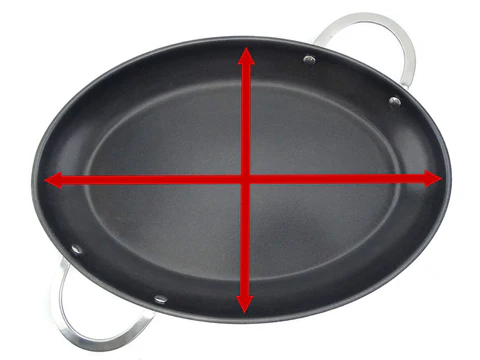
Fish pans and roasters often have an oval shape. As shown above with the square pans, the longest internal dimension is given here. Such a 38 cm fish pan has an inner length of 38 cm on its longest side. At right angles to this is the short side of eg 24 cm. As a result, the pan would be declared as 38 x 24 cm.
2) Bottom diameter = contact surface
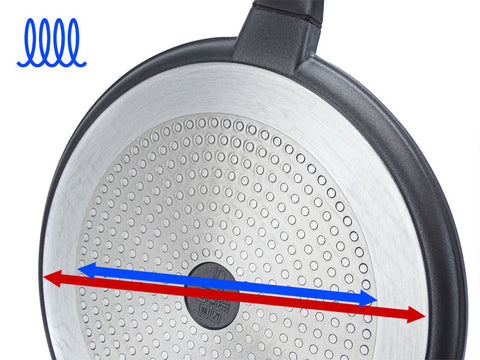
When we talk about base diameter, we mean the diameter of the contact surface, i.e. the surface with which the pan, pot or roaster stands on the stove. Not meant is the frying surface! The information about the base diameter can be helpful when it comes to choosing a suitable cooking surface for the cookware. The size of the cooker and the diameter of the base of the cookware should match to a certain extent in order to avoid damage to the cookware and to ensure that the cookware functions as well as possible.
ATTENTION, induction-suitable aluminum cookware:
Please note that cookware made of aluminum / cast aluminum for induction cooking usually has a stainless steel disc on the base, the diameter of which is often smaller than that of the base (marked in blue in the picture). Where this applies, you will find the corresponding information in our item descriptions.
3) Height of pots and pans

Unless expressly stated otherwise, the indication of the height of a cookware describes the outer edge height, from the top edge of the cookware perpendicularly to the contact surface, without taking lids, handles etc. into account.
The inner height (i.e. from the frying surface up to the edge) can be determined approximately by subtracting the base thickness from the height.
4) Capacity of a cookware

When it comes to capacity, there are often misunderstandings: the capacity of a cookware indicates how much the container can hold at most. That always means filling up to the brim! This is international standard. The filling quantity that can be used when cooking is always less than the capacity.
Please note that in the case of pressure cookers, for safety reasons, the filling quantity permitted in pressure cooking is significantly lower than the capacity of the pot.
 DE: 4.90 €
DE: 4.90 €
 EU: from 14.90 €
EU: from 14.90 €
 UK: from £18.40, delivered duty paid
UK: from £18.40, delivered duty paid
 CH: from 19.90 € (duties & charges may apply with / after delivery)
CH: from 19.90 € (duties & charges may apply with / after delivery)
 USA & CND: from 35.70 € (duties & fees may apply with / after delivery)
USA & CND: from 35.70 € (duties & fees may apply with / after delivery)
More details about shipping costs here.


